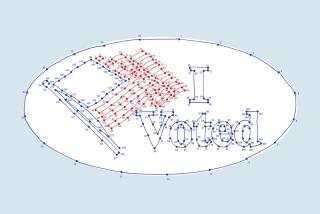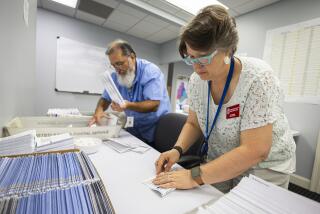Committee Clears Ban on E-Voting
- Share via
SACRAMENTO — The Senate Elections Committee, upset that counties are challenging the secretary of state’s restrictions on electronic balloting devices, cleared legislation Wednesday that would ban all electronic voting in the November election.
“I believe the secretary of state is on solid legal footing. What he has done is reasonable,” Sen. Ross Johnson (R-Irvine) said. “If the counties are going to basically thumb their nose at the secretary of state, I think it’s important we have a backup.”
Johnson said he also was concerned about the reliability and security of electronic machines.
The measure needs two-thirds approval from the state Senate and Assembly and the approval of Gov. Arnold Schwarzenegger -- potentially steep challenges because of organized and widespread opposition from counties that want to use the equipment in November.
If approved, the legislation would shut down the swiftest shift to electronic voting systems in the nation. Nearly 6.5 million California voters cast ballots electronically in the March election, accounting for 43% of votes cast in the state on election day and more than any other state in the nation.
Johnson and Sen. Don Perata (D-Oakland) submitted the legislation in response to widespread problems with electronic voting equipment during the March primary.
Machines in San Diego County failed to operate, delaying the opening of more than half of the polling places. In Orange County, thousands of voters were given the wrong ballots because of poll worker training problems.
On Wednesday, representatives of groups for physically and visually disabled people argued in support of the electronic machines, telling the Senate Elections Committee that the devices make it easier for disabled people to vote without assistance from poll workers.
Kim Alexander, president of the California Voter Foundation, told senators the state should not allow voting machines unless they produce paper receipts that can be viewed by voters and stored by election officials as a backup should the machines falter.
Last week, Secretary of State Kevin Shelley banned the use of e-voting equipment in four counties, including San Diego, and said 10 others could not use their machines on election day unless they met new security guidelines. Those measures call for the counties to submit security and training plans, produce a paper copy of every ballot cast electronically and offer paper ballots to voters who don’t want to vote electronically.
The Riverside County Board of Supervisors voted Tuesday to sue Shelley, seeking to override his conditional ban of e-voting machines used by the county since 2000. At least five other counties are considering legal action.
Roy Wilson, chairman of the Riverside County Board of Supervisors, said he was dismayed by the senate committee’s action.
“I can’t believe the committee members are so backward-thinking,” he said. “Where there’s a problem with electronic voting, you need to fix it. But ... Riverside County has a track record of 29 flawless elections with electronic voting machines. It makes absolutely no sense to legislate an abandonment of a proven system.”
The proposed lawsuit by Riverside, the first large county in the nation to switch to touch-screen voting -- and the senators’ stern response -- marked the latest chapter in a long-standing dispute between the state and some county election officers.
In February, 10 county election officials sent a defiant letter to Shelley, challenging directives he intended to impose on them in the March election. They said they considered themselves colleagues of the secretary of state, “not your subordinates,” and said his directives were not enforceable.
Then came the problems in March.
Shelley said he decided to ban the machines for several reasons. One model, made by Diebold Election Systems of Texas, has not received federal approval. Security and reliability issues led him to ban the others, but he promised to approve them if they meet new guidelines.
More to Read
Get the L.A. Times Politics newsletter
Deeply reported insights into legislation, politics and policy from Sacramento, Washington and beyond. In your inbox three times per week.
You may occasionally receive promotional content from the Los Angeles Times.











